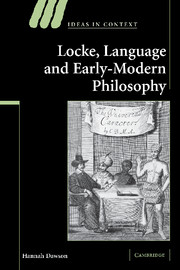Book contents
- Frontmatter
- Contents
- Acknowledgements
- Notes on the text
- Introduction
- PART I LANGUAGE IN THE TRIVIUM
- PART II PHILOSOPHICAL DEVELOPMENTS OF THE PROBLEM OF LANGUAGE
- 4 The relationships between language, mind and word
- 5 Semantic instability: a containable threat
- 6 Under cover of sensible and powerful words
- PART III LOCKE ON LANGUAGE
- Bibliography
- Index
- IDEAS IN CONTEXT
4 - The relationships between language, mind and word
Published online by Cambridge University Press: 22 September 2009
- Frontmatter
- Contents
- Acknowledgements
- Notes on the text
- Introduction
- PART I LANGUAGE IN THE TRIVIUM
- PART II PHILOSOPHICAL DEVELOPMENTS OF THE PROBLEM OF LANGUAGE
- 4 The relationships between language, mind and word
- 5 Semantic instability: a containable threat
- 6 Under cover of sensible and powerful words
- PART III LOCKE ON LANGUAGE
- Bibliography
- Index
- IDEAS IN CONTEXT
Summary
The mirror that language held up to the world, which we met in logic, was in some ways shattered during the sixteenth and seventeenth centuries. As the regiments of the ‘scientific revolution’ laid siege to the forms and species of Aristotelian ontology, the old words and classifications no longer fitted the new world that was being discovered. Moreover, with the reinvention of ancient scepticism and with epistemological transformations more broadly, human experience, which had seemed to deliver the world to men, came to be doubted as a reliable conduit. As the unity of subject and object was threatened, so too was the derivative unity between word and object. Appearance divided from reality and took language with it.
However, this did not necessarily mean that a veil of ideas was draped before us or that language fell away from reality. Resounding warnings were raised about the dangers of error and dogma, and many philosophers, particularly those who set great store by the senses, did see a large fraction of our thoughts and words reflect more on the human subject than on the objective world. But they were not idealists. The vast majority made tentative – or not so tentative – claims about how the mind, and therefore language, could capture the world. And far from being preoccupied with Pyrrhonian incredulity, many, if they engaged with it at all, used it as a foil, and confidently set about describing the world.
- Type
- Chapter
- Information
- Locke, Language and Early-Modern Philosophy , pp. 91 - 128Publisher: Cambridge University PressPrint publication year: 2007



